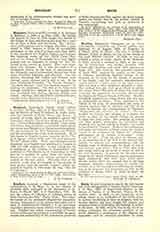

Bouillon, EMMANUEL THEODORE DE LA TOUR D’AUVERGNE, CARDINAL DE, French prelate and diplomat, b. August 24, 1643, at Turenne; d. March 2, 1715, at Rome. The son of Frederick Maurice, Prince of Sedan, he was of the family of the great Marshal Turenne. In 1658, he was appointed a canon of Liege; doctor of the Sorbonne in 1667; created a cardinal in 1669, at the early age of twenty-four, and, finally, provided with several rich benefices and made chief almoner to Louis XIV. But Louvois, the powerful minister of Louis XIV, inspired by enmity to the house of Turenne, successfully opposed certain of his demands on the king for the benefit of members of his family, and the cardinal’s disappointment vented itself in a bitter satire on his royal master. This was used to effect Bouillon’s downfall at court. The cardinal then put forth great efforts to obtain the vacant Prince-Bishopric of Liege, but could not overcome the opposition of Louvois, who secured the dignity for Clement Joseph of Bavaria. Bouillon eventually regained the royal favor and was sent as ambassador to Rome. There, contrary to the wishes of his king, he championed the cause of Fenelon against that of Bossuet and did all he could to prevent the condemnation of Fenelon’s “Explication des maximes des Saints”. He was recalled to France, but alleging as a reason his duties as Dean of the Sacred College, he refused to obey the royal order. His property in France was then seized, whereupon he submitted and returned, but, on his arrival in France, was exiled to his Abbey of Tournus. While in this retirement, and under the influence of bitter ennui, the cardinal caused to be composed by Baluze his “Histoire genealogique de la maison d’Auvergne” (1708, 2 vols. in fol.). From his place of retreat, also, on the breaking out of the War of the Spanish Succession, he entered into correspondence with the English Duke of Marlborough, the Earls of Orrery and Galway, and others; and in 1710, after long and vainly soliciting his recall to court, he fled to the Low Countries. A warrant for his arrest was issued by the Royal Parliament, and his possessions again confiscated. But after some years spent abroad, during which the cardinal sent to the king numerous memoirs, endeavoring to justify his conduct, he at last succeeded in obtaining the restitution of his revenues and permission to take up his residence at Rome, where he spent in peace his last days.
EDWARD A. GILLIGAN

